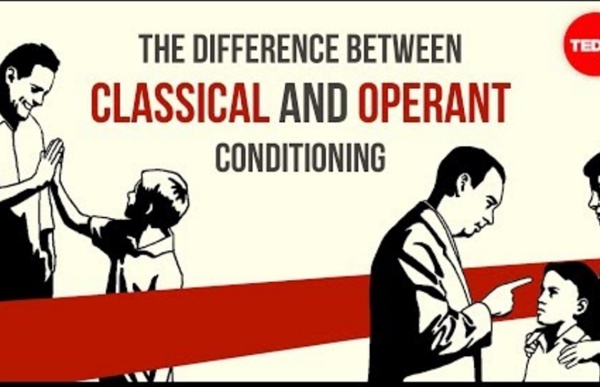



http://www.youtube.com/watch?v=H6LEcM0E0io
Related: Operant Conditioning: How does it influences behaviours of teenagers • Promoting Road Safety: A Psychological Approach • Guiding your teenage children through reinforcement and punishment • Reinforcements and Punishments - Parents Guide for your teenagers • PSY108 TMA01 Part 1Operant Conditioning - An explanation Skinner - Operant Conditioning Operant conditioning is a method of learning that occurs through rewards and punishments for behavior. Through operant conditioning, an individual makes an association between a particular behavior and a consequence (Skinner, 1938). By the 1920s, John B.
Rewarding safe drivers could make roads safer Insurance schemes that reward safe drivers with lower premiums can actually help prevent accidents, according to a report from the Swedish National Road and Transport Research Institute (VTI). “Pricing of car insurance that is aimed at rewarding safe traffic behaviour can help limit the number of accidents,” the VTI reports in a press release. The report proposes giving insurance companies access to police records of individual traffic offences and crimes - a suggestion that not surprisingly is controversial. In Norway drivers have been made to toe the line since 2004 with a system that assigns penalty points to driver’s licenses for various offences.
How Negative Punishment Works Negative punishment is an important concept in B. F. Skinner's theory of operant conditioning. Punishing a Child Is Effective If Done Correctly TORONTO — While recently published parenting books have preached the effectiveness of positive parenting and “no drama” discipline, psychologists presenting at the American Psychological Association’s 123rd Annual Convention said don’t put timeout in timeout yet. “Parental discipline and positive parenting techniques are often polarized in popular parenting resources and in parenting research conclusions,” presenter and researcher Robert Larzelere, PhD, of Oklahoma State University, said at a symposium. “But scientifically supported parenting interventions for young defiant children have found that timeouts and other types of assertive tactics can work if they’re administered correctly.” In his presentation, Larzelere said his research team interviewed 102 mothers who provided detailed descriptions of five times they had to discipline their toddlers for hitting, whining, defiance, negotiating or not listening.
Does Punishing Speeders Prevent Speeding? – Association for Psychological Science – APS Speeding leads to more car accidents worldwide than almost any other behavior behind the wheel. The World Health Organization (WHO) has cited speeding as the main cause of nearly 30% of all serious or fatal crashes across the globe. Despite the risks of death or injury, people often admit to intentionally speeding. International studies have found that between 66% and 85% of drivers admit to exceeding speed limits. Although measures like speed traps and red-light cameras aim to cut down on speeding, it’s unclear whether these penalties actually improve behavior on the road. A team of Spanish researchers led by Francisco Alonso looked at whether current speeding penalties actually convince people to change their behavior.
What is Negative Punishment (Examples and Effectiveness) In this article, we will review negative punishment, its definition, examples, and drawbacks. American psychologist B.F. Skinner developed the theory of operant conditioning, which stated that a person or animal’s behavior could be increased or decreased by adding or removing appropriate stimuli after the behavior is exhibited. The difference between classical conditioning and operant conditioning is that classical affects unconscious behavior, while operant affects conscious behavior. Within operant, punishment aims to reduce a behavior while reinforcement increase a behavior.
Why you should stop yelling at your kids The use of spanking to discipline children has been in decline for 50 years. But yelling? Almost everybody still yells at their kids sometimes, even the parents who know it doesn’t work. Yelling may be the most widespread parental stupidity around today. Households with regular shouting incidents tend to have children with lower self-esteem and higher rates of depression. Seminar 3 at CCNY » Punishment as a device for accident prevention. Deterrent effects of traffic enforcement. From the very beginning of road traffic history people understood that without any laws or regulations, all movement on the roads would be in the so-called “state of nature,” which means that the molecules within an environment, represented as cars on the city streets, would be in constant and uncontrolled motion, allowing for random collisions and accidents. The existence of this traffic’s tendency towards chaos contributed to the evolution of traffic environment – first traffic legislation, the “Locomotive on Highways Act”, was adopted by the British Parliament in 1861 and limited the weight of allowed vehicles to 12 tons as well as imposed a 10 mph speed limit (Ross, 1993). Furthermore, more and more elements and control devices have been added to the system, including first license plates in France in 1893, first driver license in the U.K. in 1904, and the first traffic light in Ohio in 1914 (Legge et al., 1993). Figure 3: “Portrait of a man begging for trouble.
This shows the difference between classical and operant conditioning, which gives an example of how it is used as well. by callistael Mar 28